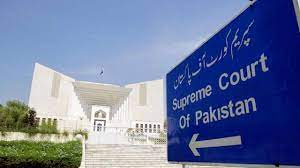The Supreme Court of Pakistan convened a full court session to deliberate on the letter authored by the six judges of the Islamabad High Court (IHC), complaining interference of spy agencies in judicial functioning and internal affairs of the courts. The letter stated that a judicial convention be called to consider the matter of interference of intelligence operatives with judicial functions and intimidation of judges in a manner that undermines the independence of the judiciary. Bar associations across Pakistan have demanded the Supreme Court’s (SC) intervention over the letter written by six Islamabad High Court (IHC) judges and urged the top judicial body to protect and defend the independence and sovereignty of judicial system in the country.
The honorable judges of the Islamabad High Court (IHC) have opened a new pandora box and exposed the bitter reality regarding the so-called independence of the judiciary and merit-based justice of our courts wherein countless verdicts are delivered in pursuit of appeasement of political leadership, military bureaucracy, colleagues and judicial High ups in clear contrast to the merit, justice and professional honesty. In fact, it is no secret, former IHC judge Justice retired Shoukat Siddiqui and former Army Chief General Qamar Javed Bajwa categorically mentioned interference and nepotism in courts’ decisions at all levels, whilst Justice retired Qayyum’s case and numerous audio leaks further exposed complicity of our adjudicators in that regard. In fact, agencies’ interference in judicial, political, administrative, Electoral and other state affairs is a long held problem since Independence, wherein the wish-list of top military bureaucrats fulfilled in the name of national interest under vague interpretation of national security and country’s sovereignty. The judges from the Islamabad High Court have displayed extraordinary courage and professional honesty by penning down a bitter reality that no other dared to confess in the past. The letter detailed numerous incidents of alleged harassment, abduction, torture, and blackmail, which are allegedly a part of the powerful spy service’s efforts to interfer in politically consequential cases. After the eye-opening revelation of the top judges, the troika of the country’s legal establishment including Attorney General for Pakistan Mansoor Awan, Law Minister Azam Nazeer Tarar and Chief Justice of Pakistan Justice Qazi Faez Isa held an in-depth discussion to deal with the matter.
In fact, judicial independence is of utmost importance for a modern nation. An independent judiciary acts as a check on the other organs of the government and maintains a balance of power. An independent judiciary is essential to resist undue influence, ensure equality, and provide remedies for justice problems. An impartial judiciary upholds the rule of law and safeguards human rights and civil freedoms. It ensures that laws are applied fairly and consistently, regardless of political pressure or personal interests. Faithful judges strike down unconstitutional laws and protect citizens from abuse of power. As social stability progresses, the public trusts the judiciary, and does not resort to violence or take justice into their own hands. Such conditions are fundamentals of a civilized society and the cornerstone of a developed and progressed nation in this modern era.
Historically, weak justice system, institutional corruption and a lack of accountability has always had an important role in institutional, moral and economic degradation of our nation. The sitting rulers and powerful bureaucrats violated oath, modified constitution and steer the country in accordance with their desire and political agenda, wherein dishonest judges issued decrees and safeguarded unconstitutional actions of civilian and military dictators in defiance to national interest and professional obligation throughout the past. The stunning letter written by six high court justices illustrates not only the extent of interference in the legal process, at the highest levels but also the willingness of public servants to go public about issue despite the risks involves in such outspoken and upright behaviour that could have worst consequences for the individuals and their families afterward.
The current situation is unique and Merits utmost courage, rationality, uprightness and professionalism from the top judicial forum. There is dire need for establishment of the writ of the law, and an institutional mechanisms to safeguard the independence of the judiciary, including measures to protect judges from threats and external influence and strengthen accountability mechanisms. No individual or institution is above the law and enjoys impunity in any pretext wherein no unlawful action and extra constitutional measures can ever strengthen the government, institution, national security, democracy etc. Constitutionally, the spy agencies have no authority/ mandate to meddle or intervene in political, legal and constitutional affairs in the country. Rather, the spy agencies must focus on their primary task and chase the terrorists, who freely roam on the roads and involved in killing innocent soldiers and civilians every other day. Pushing politicians, press, or the judiciary is wrong, counterproductive and is bound to have consequences. Meanwhile, judges should neither seek undue favour from parliament and bureaucracy nor accept unlawful demands of bureaucrats. The judiciary must resist undue pressure from all quarters and maintain its professional ego and respect through transparent, unbiased and merit-based justice delivery to the public.







